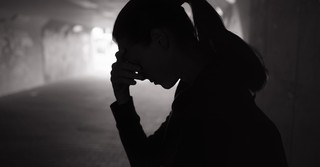If Christians Are Saved, Do They Still Have a Sinful Nature?
Share

Almost every story has a villain. In our story, our sinful nature is the villain.
Evidence of our sinful nature is all around us. People steal, so we have locks and passwords. People lie, so we have courts and judges. People kill each other, so we have police and militaries.
Jesus is the hero of our story. He died on the cross to save us from sin and death. But just how “free” from sin are Christians supposed to be? Is the part of us that longs to sin—our sinful nature—still there? And if it is, has Christ’s sacrifice really made a difference in our lives? Has good really won?
To answer those questions, we need to delve into what the Bible says about our sinful nature.
What Is a Sinful Nature? Does the Bible Talk About It?
In the book of Genesis, Adam and Eve were created “very good” (Genesis 1:31). But once Adam and Eve committed the “original sin,” the nature of humanity itself was affected. Now, as Jeremiah says, “the human heart is desperately wicked” (Jeremiah 17:9), and as David says in Psalm 51:5, “I was sinful when my mother conceived me.”
In Romans 7, Paul describes how even if we know what is right and desire to do it, this “sinful nature” sabotages our efforts.
For I know that good itself does not dwell in me, that is, in my sinful nature. For I have the desire to do what is good, but I cannot carry it out, Romans 7:18, NIV.
The word translated “sinful nature” in the NIV is the Greek word “sárks,” and is more literally translated as “flesh.” It’s not only used to refer to sin, but also to natural, healthy human desires (see Ephesians 5:31). However, it’s most often used to highlight how those desires often direct us selfishly, away from God’s desire. Just as Adam chose to try to “be like God” and determine good and evil for himself, now we carry on that same nature, pushed by our own self-centered desires—and we deserve God’s punishment because of it.
To many, this seems unfair. Shouldn’t we each get a clean slate? Why should Adam’s “original sin” make us sinful and guilty? But the book of Romans lays out this truth very clearly—and uses it to illustrate the corresponding power of Christ’s grace.
“Therefore, just as sin came into the world through one man, and death through sin, and so death spread to all men because all sinned…For if, because of one man's trespass, death reigned through that one man, much more will those who receive the abundance of grace and the free gift of righteousness reign in life through the one man Jesus Christ” (Romans 5:12, 17 NIV).
It is this premise—that Adam’s sin trapped us all in sin and death—that allows Christ’s perfect sacrifice to free us from that sin and death. But if Adam’s original sin is what gave us our sinful nature, shouldn’t Christ’s sacrifice remove it?
If Christians Are Saved, Do They Still Have a Sinful Nature?
James 3:2 says, “We all stumble in many ways” (NIV). James 5:16 admonishes believers to confess their sins to one another and pray for each other. These are not descriptions of a past problem, but an admission of an ongoing struggle with sin.
It’s not just the book of James that highlights the believer’s struggle with sin. Numerous verses talk about how to confront sin within the church (Galatians 6:1, Luke 17:3, Matthew 18:15-17, 1 Timothy 5:19-20). Scripture even describes prominent believers such as Moses, David, and Peter committing sins (Numbers 20:1-13, 2 Samuel 11-12, Mark 14:66-72, Galatians 2:11-14).
These passages match our own personal experiences with ongoing temptations and weaknesses in our character. But what about passages that describe being “dead” to sin and “free” from its power? What about passages that say a believer cannot continue to live in sin?
We know that everyone who has been born of God does not keep on sinning, but he who was born of God protects him, and the evil one does not touch him, 1 John 5:18, ESV
He himself bore our sins in his body on the tree, that we might die to sin and live to righteousness. By his wounds you have been healed, 1 Peter 2:24, ESV
How can we who died to sin still live in it?. . For one who has died has been set free from sin, Romans 6:2b, 7, ESV
These passages, as well as others, indicate that Christians shouldn’t just live the same way as before we were saved. We should be changed. We should be free.
Yet these verses don’t cancel out the previous ones. Somehow, they must all be true. But how? How can Christians both struggle with sin and also be free from it? The answer comes in two parts: salvation and sanctification.
Salvation is freedom from the punishment of sin. When we accepted Christ’s perfect sacrifice, we made him our Savior, and his blood washed us free of our guilt. But salvation is not the end. Salvation opens the door to the next gift: sanctification, the freedom from the power of sin.
Unlike salvation, sanctification is not instantaneous. Sanctification is the race we run, the war we fight, the path we tread. It’s the process of becoming more like Christ, and it continues throughout our lives. However, the moment we receive salvation, we also receive a Helper to guide us on our journey: the Holy Spirit.
Therefore, brothers and sisters, we have an obligation—but it is not to the flesh, to live according to it. For if you live according to the flesh, you will die; but if by the Spirit you put to death the misdeeds of the body, you will live. For those who are led by the Spirit of God are the children of God. The Spirit you received does not make you slaves, so that you live in fear again; rather, the Spirit you received brought about your adoption to sonship. And by him we cry, “Abba, Father.” The Spirit himself testifies with our spirit that we are God’s children. Now if we are children, then we are heirs—heirs of God and co-heirs with Christ, if indeed we share in his sufferings in order that we may also share in his glory. . . We know that the whole creation has been groaning as in the pains of childbirth right up to the present time. Not only so, but we ourselves, who have the firstfruits of the Spirit, groan inwardly as we wait eagerly for our adoption to sonship, the redemption of our bodies. For in this hope we were saved. But hope that is seen is no hope at all. Who hopes for what they already have? But if we hope for what we do not yet have, we wait for it patiently,Romans 8:12-17, 22-25, NIV
Instead of simply wiping temptation from our minds, God did something better: He gave us the Holy Spirit to guide us in loving Him, loving others, and pursuing good. And in the light of that new desire, sin begins to lose its appeal. This work of the Holy Spirit is the “firstfruit” of a great harvest we will one day enjoy—redeemed bodies and a redeemed world, completely free from our sinful nature and the death it brings.
Why Is the Concept of a 'Sinful Nature' so Central to Christianity?
Many times, theological terms such as “original sin” and “sinful nature” feel intimidating, intellectual, and even irrelevant to living out the Christian life. But such theological concepts are a summary of the core truths of Scripture—a glimpse of the grand tapestry of God’s story.
If we aren’t clear on why humanity has a problem with sin, we won’t be clear on why we need Christ—or how he saves us (Romans 5:17). If we aren’t clear on the power of our sinful nature, we won’t be clear on the power of the Holy Spirit working within us (Romans 8:13).
God is the hero of the Gospel story. Sin is the villain. Trying to understand the Gospel without understanding the meaning of sin is like sleeping through half a movie and trying to understand the ending. It may be an exciting and enjoyable story, even if you don’t understand everything that’s happening. But when you watch the whole thing, you appreciate it in a new way.
That’s why there is value in theological terms like “sinful nature.” Because the more we understand the overarching themes of God’s Word, the more see how good and beautiful God’s plan truly is—and how much He’s done for us.
Photo credit: ©Getty Images/kieferpix
